Strawberries 101
Who doesn’t love strawberries?! I recently purchased some to experiment with my seemingly greenish thumb. I love picking berries and eating them before I leave for work or when I come home!
I bought the strawberries below around February 11.
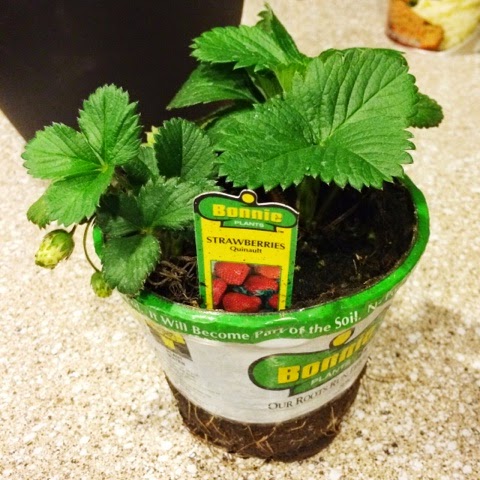
And they started producing berries! Some of them got fairly funky shaped… but they still tasted pretty swell. Not much berries since though. I’ve been picking them off so I can get more leaves!
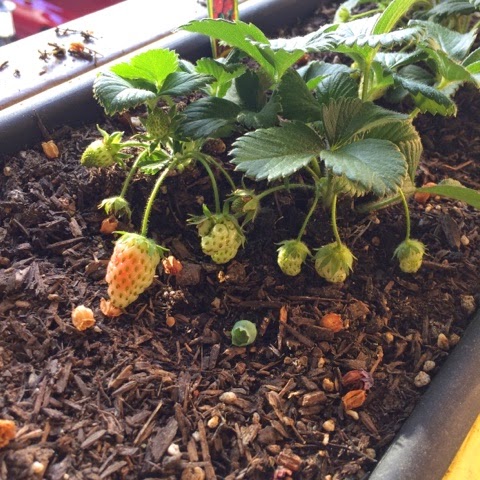
This here was my first real good looking berry. It was still pretty little compared to berries everywhere else, but I grew it! And it was so sweet! I’m hoping that when my plants get a little more established that they will be able to produce a little bit bigger berries.

This here is what a cute little strawberry flower looks like. 🙂 And yes, the middle is what will eventually turn into a strawberry. So precious!
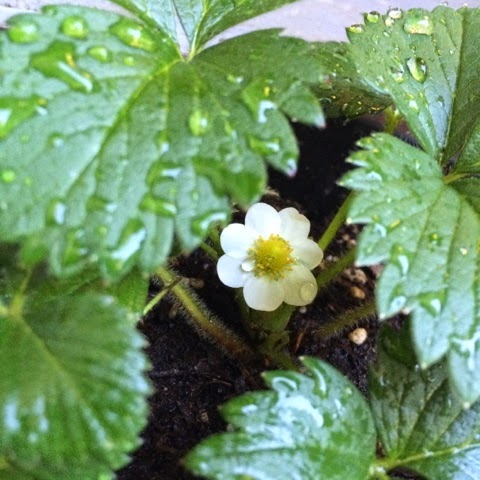
Berry Info:
Quinault Strawberry
Planting:
Space 6 to 18 inches apart, depending on type. (Read the stick tag that comes with the plant for specific spacing recommendations.) Be careful not to bury the crown of the plant, or it will rot.
Strawberries are also sprawling plants. So seedlings will send out runners, or ‘daughter’ plants, which in turn will send out their own runners. Pretty neat huh? Because of this, if you are wanting to plant quite a few of them, make sure you space them a little further apart. However, I didn’t really do that… I have a balcony hanging planter thing that has 2 strawberry plants in them, and they are closer to 6 inches apart.. they seem to be doing fine though! My other one is in its own pot and seems to be doing great as well!
Light requirements:
Full sun. Strawberries require 6-10 hours a day of direct sunlight, so choose your planting site accordingly. I have my berries in the morning sun since I’m in zone 11 and I don’t want the heat mixed with the sun to scorch my plants!
Soil requirements:
Strawberries need well-drained, nutrient-rich soil. Amend heavy clay or sandy soil with compost or other organic matter prior to planting. Create raised beds if soil is heavy or drains poorly. Soil pH should be between 5.5 and 6.8.
In the first year, its a good idea to pick off blossoms. This discourages the plant from fruiting. If not allowed to bear fruit, they will spend their food reserves on developing healthy roots and more leaves. The yields will also be much greater the second year.
Water requirements:
Keep soil consistently moist throughout the growing season. Moisture is the key to plump, fully-formed berries. Mulch soil to reduce water evaporation.
Moisture is incredibly important due to shallow roots. Water adequately, about one inch per week. They need a lot of water when the runners and flowers are developing and again in the fall when the plants are mature. Also, make sure you keep in mind about your climate! If it’s warmer, you will need to water more frequently.
Frost-fighting plan:
Strawberry plants are sensitive to frost. Temperatures of 28º F or less (a hard frost) damage flowers. Protect newly planted seedlings and established, budded plants by covering plants with straw or a frost blanket. By fall, strawberry plants have formed the flower buds that will open the following spring. To protect them through winter, apply a 2- to 3-inch mulch of straw, pine straw, or other loose organic material.
Common issues:
Slugs can be a problem when using organic mulch, so use plastic mulch to discourage them). Keep birds from feasting on berries by covering plants with plastic bird netting. Small, misshapen berries are can be caused by drought or high temperatures.
Harvesting:
Pick berries in the morning, when fruits are cool. Select fully formed and colored berries, as unripe berries won’t continue to ripen once picked. Carefully pull strawberries (with stems) from plants. Aim to leave about a half-inch stem on each berry.
Storage:
Refrigerate unwashed berries (caps still on) in a plastic container with a loose-fitting lid. Place a paper towel in the bottom of the container before adding berries, then arrange berries in single layers separated by clean paper towels. For peak flavor, use within 2 to 3 days, although berries may last up to 7 days.
vv Down there is my brand new and a two months later photo. vv
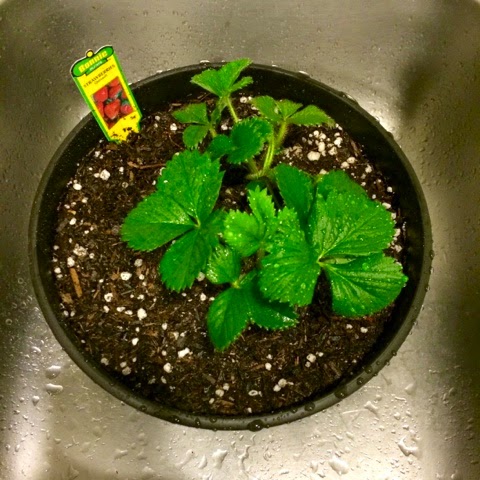
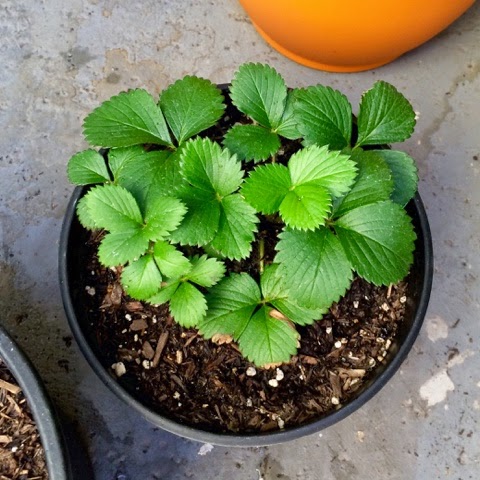
It looks so great and healthy! I’m a little afraid that I won’t be getting much more berries though. I feel like I’ll have to water them a lot more to get good berries in this dry heat. They tend to dry out… I’m still in the process of figuring this all out, but so far so good. I love strawberries. Strawberry fields forever! <3
Happy planting!



You May Also Like

Sunflowers 101
February 28, 2015
Orchid 201
May 11, 2018
2 Comments
stephanie
oh my goodness. i dream of growing strawberries but unfortunately i have a TERRIBLE track record with ALL plants. ughhh. they're SO CUTE though!!!
Trissa Bouwhuis
They taste SO much better home grown! And a tiny berry smells soooo good! I just can't wait until I have bigger and more plants so I can have bigger and more berries! 🙂 Also, strawberries aren't very hard to go. You just can't forget to water them!